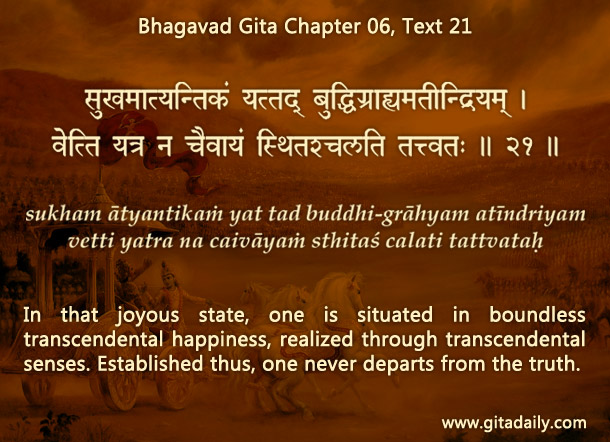If we don’t hold a mirror to ourselves, we may end up having no inclination or even an aversion to holding a mirror to ourselves. The Bhagavad Gita (6.20) states that in the state of spiritual realization, ‘yatra chaivātmanātmānam paśhyann ātmani tuṣhyati,’ we look at ourselves, and we feel satisfied in what we see; in fact, we delight in what we see. This is a significant statement because whether we take it literally or metaphorically, most people don’t feel satisfied, let alone delighted, when they look at themselves in a mirror. Self-Reflection for Satisfaction
However, if we look at ourselves in a mirror physically, we often feel dissatisfied that we don’t look good enough. Most of the time, we may feel we are too fat, too thin, too tall, too short, too dark, or too fair. It’s always something about our physical features that leaves us unsatisfied, if not dissatisfied. If we consider a metaphorical mirror that we hold before ourselves, then again, the picture that we see is often unflattering.
We can see our vices and our shortcomings, our mistakes, our defects, and our deficiencies, which leave us feeling dissatisfied or even distressed. Indeed, because introspection can be so uncomfortable, many people hesitate to do it at all. Nonetheless, it’s vital that we focus and regularly try to hold a mirror to ourselves because otherwise, the things that are wrong with us will not only perpetuate but also aggravate.
And despite our vehement denial that we have any faults or our reluctance to hold a mirror to ourselves, there is a part of us that does know where we are and what we are doing. And that part leaves us cold and gives us cold feet, making us no longer want to look at ourselves. Thus, this becomes a peculiar malady where the worse the malady, the less the patient wants to even get a check-up in fear of what might be revealed through the check-up.
All along, we internally go down from deterioration to degradation to self-destruction. Thankfully, the Bhagavad Gita informs us that there is a reality to our core that is always positive and pure, and that is our spiritual identity. As souls, each one of us is a precious and beloved part of the divine, and thus, we are filled with divine potential.
When we look inward, if we look deep enough, we can see beyond the darkness. As disconcerting and even deadly as it may seem, we can reach the light of the soul. And the more we learn to hold on to that spiritual essence and the potential within that spiritual essence, the more introspection can become hopeful, hope-inducing, and gradually even joy-inducing.
Whenever we are trying to focus on meditation, while the primary focus is on Krishna, secondarily, it is our own inner world that also gets illuminated because, to some extent, we are left alone with our thoughts. And though that is not the best state to be in, it doesn’t matter too much because we all can be elevated and liberated by the steady connection that we establish between the soul within and the Supersoul within through the practice of meditation. When we are chanting mantras, the sound is not meant to come simply from our lips or our mouth or our throat. It is meant to come from the very core of our being, a call from the soul within to invoke the Lord, who is also within. The more our meditation establishes a bond between the soul and the Supersoul, the more both these spiritual realities become manifest to us.
Thus, meditation starts creating increasingly a positive vision of ourselves, and as a result, brings a concomitant positive emotion when we hold the mirror to ourselves, as described in Gita (6.21).
Summary:
- Holding a mirror to ourselves, either physically or metaphorically through introspection, often leaves us feeling dissatisfied or even distressed. If, however, we don’t hold a mirror to ourselves regularly, whatever is wrong within us will worsen and simultaneously worsen our aversion to holding a mirror to ourselves until we slide down from degradation to utter destruction.
- Meditation through the chanting of mantras establishes a link between the soul and the Supersoul, thereby causing both to manifest within, which helps us see and feel much more positive whenever we hold a mirror to ourselves.
Think it over:
- What effect on deficiency did you notice last time whenever you held a mirror to yourself through introspection?
- Have you noticed that after you do something reproachable, your tendency to hold a mirror to yourself decreases?
- Recollect such an incident to realize the gravity of the problem.
- Recollect an incident when meditation has led to making you more comfortable about introspection and helped you see your inner world more positively.
06.21 In that joyous state, one is situated in boundless transcendental happiness, realized through transcendental senses. Established thus, one never departs from the truth.


Leave A Comment